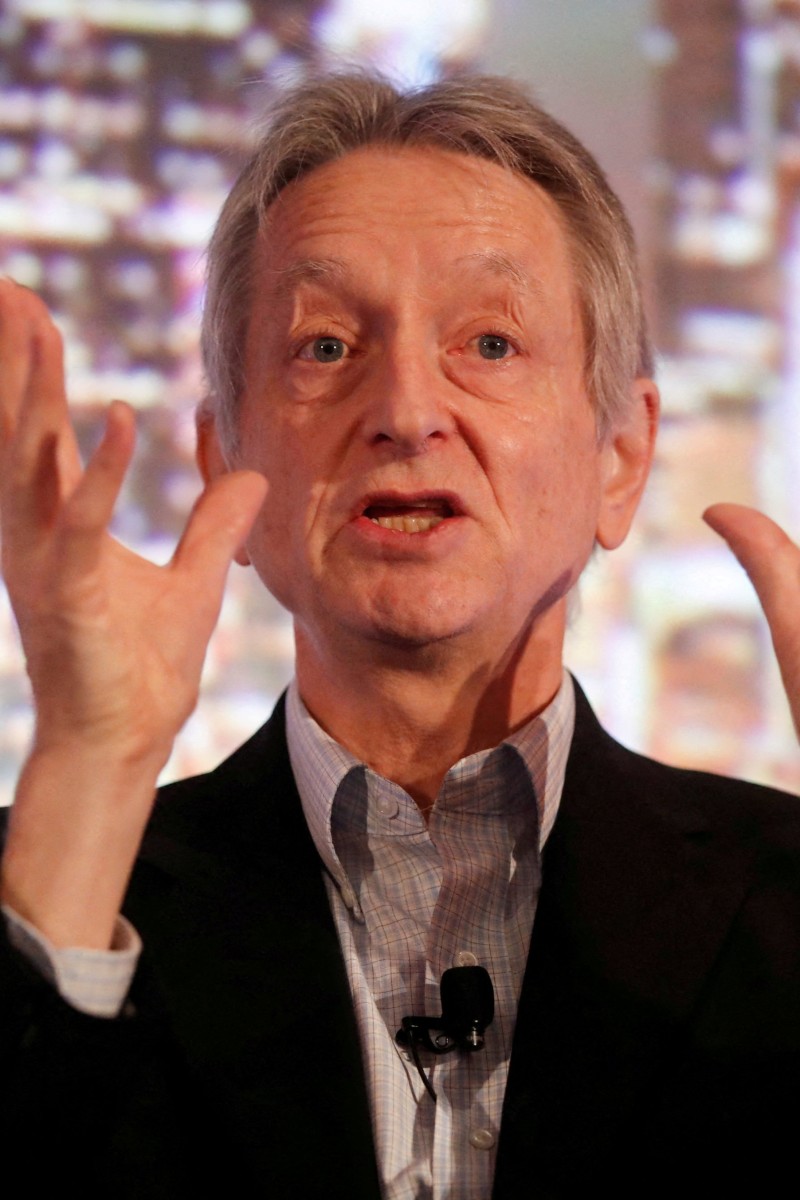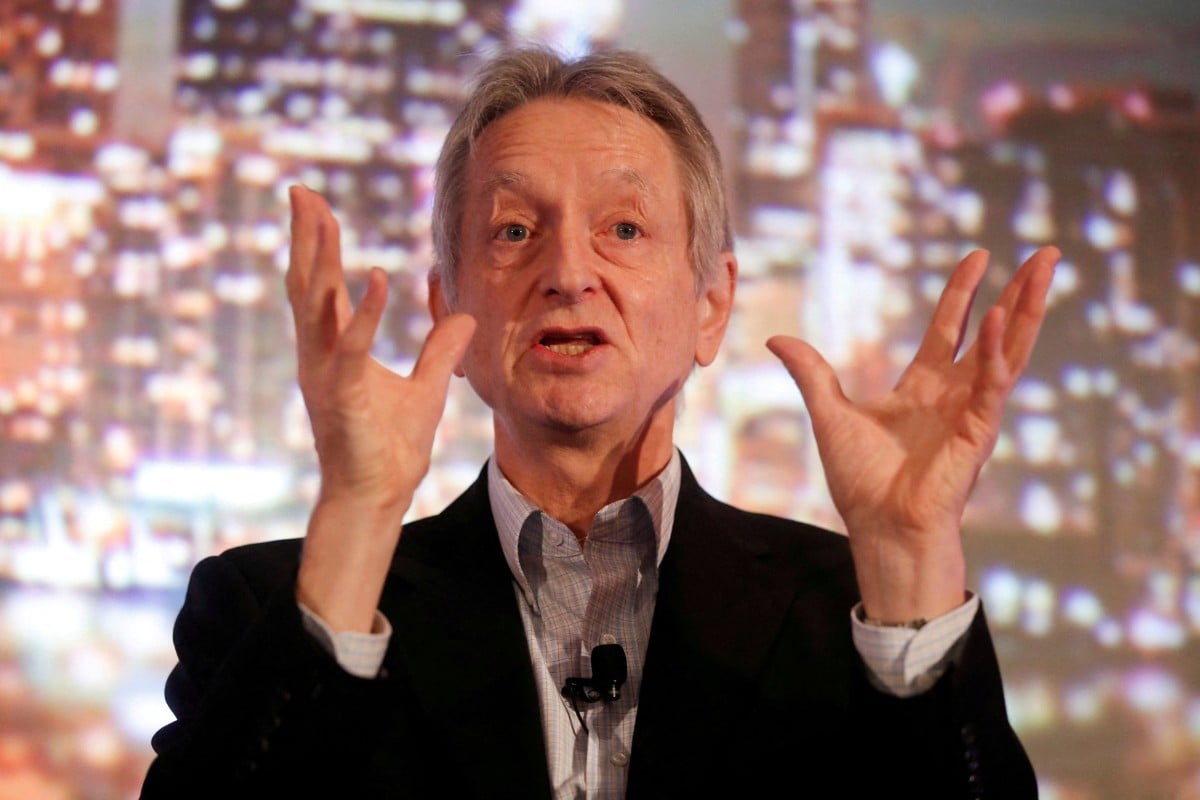
Study Buddy (Challenger): AI pioneer says the tech’s threat may be ‘more urgent’ than climate change
- Geoffrey Hinton is among tech leaders expressing concern about potential threat of artificial intelligence if machines become smarter than humans and take over the planet
- This page is for students who want to take their reading comprehension to the next level with difficult vocabulary and questions to test their inference skills
 Artificial intelligence pioneer Geoffrey Hinton is known as one of the “godfathers of AI”. Photo: Reuters
Artificial intelligence pioneer Geoffrey Hinton is known as one of the “godfathers of AI”. Photo: ReutersContent provided by British Council
Read the following text, and answer questions 1-9 below:
[1] Artificial intelligence could pose a “more urgent” threat to humanity than climate change, AI pioneer Geoffrey Hinton told Reuters in an interview last month. Hinton, widely known as one of the “godfathers of AI”, recently announced he had quit Alphabet after a decade at the firm, saying he wanted to speak out on the risks of the technology without it affecting his former employer.
[2] Hinton’s work is considered essential to the development of contemporary AI systems. In 1986, he co-authored the seminal paper “Learning representations by back-propagating errors”, a milestone in the development of the neural networks undergirding AI technology. In 2018, he was awarded the Turing Award in recognition of his research breakthroughs.
[3] But he is now among a growing number of tech leaders publicly espousing concern about the possible threat posed by AI if machines were to achieve greater intelligence than humans and take control of the planet. “I wouldn’t like to devalue climate change. I wouldn’t like to say, ‘You shouldn’t worry about climate change.’ That’s a huge risk too,” Hinton said. “But I think this might end up being more urgent.”
[4] He added: “With climate change, it’s very easy to recommend what you should do: you just stop burning carbon. If you do that, eventually things will be OK. For this, it’s not at all clear what you should do.”
[5] Microsoft-backed OpenAI fired the starting pistol on a technological arms race in November, when it made AI-powered chatbot ChatGPT available to the public. It soon became the fastest-growing app in history, reaching 100 million monthly users in two months. In April, Twitter CEO Elon Musk joined thousands in signing an open letter calling for a six-month pause in the development of systems more powerful than OpenAI’s recently launched GPT-4. Signatories included Stability AI CEO Emad Mostaque, researchers at Alphabet-owned DeepMind, and fellow AI pioneers Yoshua Bengio and Stuart Russell.
[6] While Hinton shares the signatories’ concern that AI may prove to be an existential threat to mankind, he disagreed with pausing research. “It’s utterly unrealistic,” he said. “I’m in the camp that thinks this is an existential risk, and it’s close enough that we ought to be working very hard right now and putting a lot of resources into figuring out what we can do about it.”
[7] In the European Union, a committee of lawmakers responded to the Musk-backed letter, calling on US President Joe Biden to convene a global summit on the future direction of the technology with European Commission President Ursula von der Leyen. Last month, the committee agreed on a landmark set of proposals targeting generative AI, which would force companies like OpenAI to disclose any copyrighted material used to train their models.
[8] Meanwhile, US President Joe Biden held talks with a number of AI company leaders, including Alphabet CEO Sundar Pichai and OpenAI CEO Sam Altman at the White House, promising a “frank and constructive discussion” on the need for companies to be more transparent about their systems. “The tech leaders have the best understanding of it, and the politicians have to be involved,” said Hinton. “It affects us all, so we all have to think about it.”
Source: Reuters, May 6
Questions
1. According to paragraph 1, what is more worrying than climate change?
2. What does Hinton’s “former employer” in paragraph 1 refer to?
3. Find a word in paragraph 2 that describes something that “strongly influences later developments”.
4. According to paragraph 2, “Learning representations by back-propagating errors” is about ...
A. the potential risks and benefits of developing superintelligent AI.
B. the advancement of technology related to AI.
C. the economic implications of AI and its potential impact on jobs.
D. the transformative impact of AI on various aspects of society.
5. In paragraph 3, what are Hinton and other tech leaders uneasy about?
6. Why does Hinton compare the AI threat to climate change in paragraph 4?
7. What is the purpose of the letter mentioned in paragraph 5?
8. In paragraph 7, the set of proposals would mean that tech companies such as OpenAI need to ...
A. declare the rationale for their decision to adopt AI technology.
B. be transparent about the technology used in their programmes.
C. publicise information about users’ rights, such as whether the company can access their personal data.
D. none of the above
9. Which of the following words best describes the overall tone of this text towards AI?
A. critical
B. ambivalent
C. empathetic
D. cheerful
Answers
1. artificial intelligence
2. Alphabet
3. seminal
4. B
5. They are concerned about the possible threat posed by AI if machines were to achieve greater intelligence than humans and take control of the planet.
6. because he wants to show that there is no clear solution to the AI threat, whereas climate change has a solution (accept other similar answers)
7. It is to call for a six-month pause in the development of systems more powerful than OpenAI’s recently launched GPT-4.
8. D
9. A
